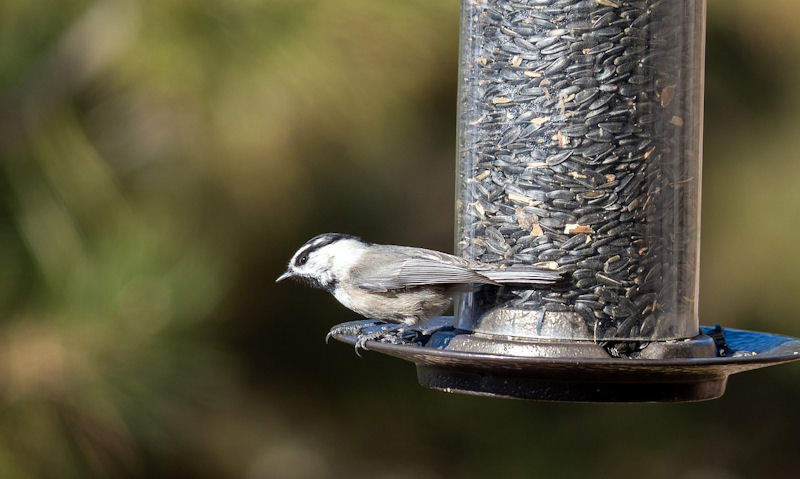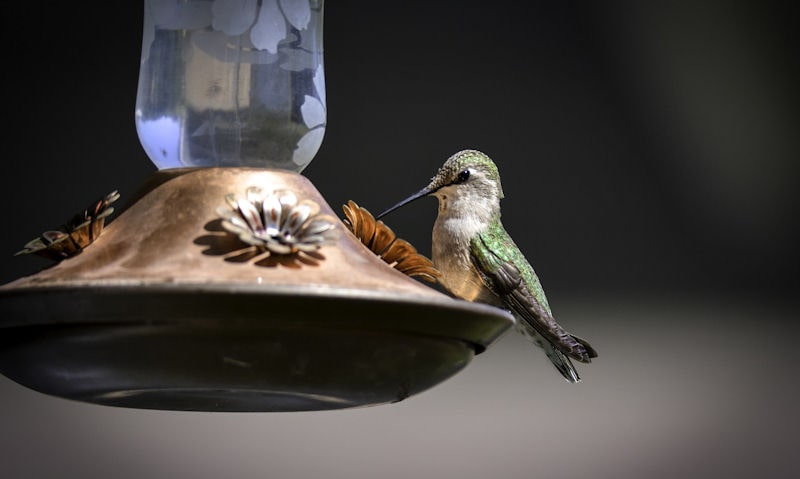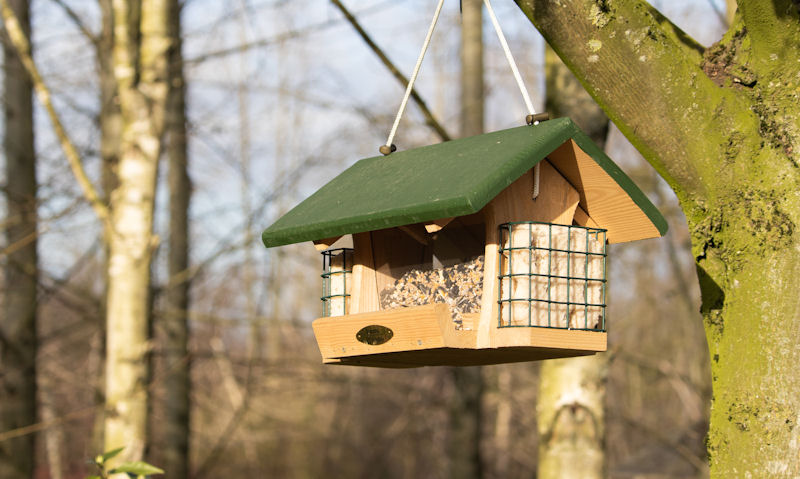Why won't birds use my bird feeder
Factors that can lead to birds not using your bird feeder could be out of your hands, thus its up too you to set up a safe, quiet and unobstructed bird feeder location for now.
Why won't birds use your bird feeder could be because birds readily available in the yard may not be bird feeder able birds. Similarly, bird species follow a strict diet with it possible you are serving up wrong bird food. Open up to all birds using all kinds of popular bird food, while using feed out of bird feeders.
It really can be an annoyance to receive no birds to a bird feeder when you have done your utmost to cater to as many common backyard birds as you can.
With that in mind there's certainly more you can do as to cater to specific bird species who may need more effort on your part - as its an ongoing process to get your bird feeder setup just the right way with various dietary needs.
In fact you may want to read up on my actionable top tips for attracting birds to feeders, as one or two tips may apply to your specific needs.
Among the most important way you can attract birds to a bird feeder is where you place the bird feeder in the yard - as an out of sight bird feeder will be an unused feeder.
Bird feeders won't be touched at all unless they're within sight of birds, as an open to the elements location within the yard is a better site than hiding bird feeders under trees.
Environment does matter mind so if birds are in fact not coming to a visible to all group of bird feeders hanging off a bird feeder pole, you may consider attracting birds with a suet feeder in a tree for example - or placing seeds on a ground bird feeder.
It all can be in vain mind you as you do need backyard birds in your area from the very beginning - so its then possible these same birds can be attracted to a bird feeder.
Never limit bird food as birds won't use a bird feeder unless what they eat is readily available inside of it. And with that, be sure what bird feed you are offering is catered to the birds in your area.
Point of the matter is bird species have their own needs, with no bird species using a bird feeder at all in some circumstances, while many others love to use them.
Feeders beyond reach
What could be the biggest reason why birds won't use your bird feeders, is because birds may not be within the area.
Birds soaring across above the yard once in a while may not be a tell many birds are in the area; birds can be flying over or occasionally landing in the yard - though without a real presence of birds in your neighborhood they won't come to bird feeders as much.
Birds come to bird feeders because there's all birds converging on it daily, and as birds come to depend on bird feeders, they will all return.
With that in mind any bird noise or bird song in calming times can further attract birds to a bird feeder.
Feeders won't be used if they're out of reach, meaning your yard and therefore your local area isn't frequented with birds.
Now that isn't to say you can change that with time and patience, but as a rule - to attract birds to a brand new bird feeder out of thin air, would be a near impossibility.
What you can do is begin the process of planting trees or blooming flowers and plants, which in turn can attract birds to this lush, green feeding grounds which can bring all birds to feed on insects - or allow birds to feed on fruits if fruiting plants are planted.
Limited bird food options
What you may not know about birds is to attract them to your bird feeder with the birds you have available in the yard at this time, you could in fact be offering these birds the wrong kind of food.
Birds of all species have their own strict dietary needs, thus seed eating birds may not be up to eating peanuts available in the yard.
What is made harder is the birds the correct bird feed is targeted towards are present, but in fact now they're not bird feeder compatible birds.
Example of that is to offer nuts to an abundance of Bluebirds in your yard can see them go unused as Bluebirds are not your traditional bird feeder birds. In fact Bluebirds may only be able to access an open top platform feeder or dish of any kind.
Blue Jays or Northern Cardinals are the same too, and well both species are open to more bird food options, the bird feeder this food can be contained within is far beyond these larger bird species abilities.
Open your bird feeders, to which should be specifically a platform bird feeder type, which will attract the most birds to it with all types of bird feed stock up in or on top of it.
Prioritize seed mixes most of all as most birds like their seeds, with many of them only foraging on the ground; be sure then to throw seeds over the lawn to cater to as many more birds as you can.
Seed eating birds will eat peanuts to some degree with dried or live mealworms certain to be eaten when available on an open top bird feeder, or if secured within if it applies.
Prioritize your wild bird food options to include suet cakes or fat balls, or if you like suet nuggets or pellets that can be thrown on the ground or piled up on a higher surface.
Remember to attract different birds to feeders you will need as many bird feeder options as you can, in order to meet the birds limited or full on ability at open to more restricting, hanging enclosed feeders.
Untouched until seen
What could really be going on why birds won't touch your bird feeder is simply because they can't see it.
Be sure to locate your bird feeders initially out in the open with a centralized location in the yard; preferably hanging up to four different bird feeders off a bird feeding station - or be sure fewer bird feeders can be seen on a Shepherd's hook.
Feeders won't be used until they are seen by as many birds who pass over above. Not all birds are guaranteed to use a bird feeder, thus you will need many birds to take notice of your feeders - to get a few of them at least to feed off what you got available.
Proceed to situate bird feeders out in the sun thus bird feeders are sure to be open to the elements.
Environment wild birds expect to feed on with bird feeders is a quiet, isolated area that is within their abilities, whereby its similar to how they forage in the wild.
Don't be too concerned about bird feeder use because those birds that do use them will certainly make the most of it in due course.
Whereby a ground bird feeder can be open on the lawn to attract strictly ground eating birds.
Birds frequent trees more often than your know so you can hang a bird feeder in a tree if a tree is grown - or at least an overflowing tree from a neighbors yard is over to yours.
A bird feeder won't be used unless its seen, rather than relying on birds coming to your bird feeders then... be sure to place feeders within their preferred natural environment.
Bird feeders in too busy area
Now that you've found the perfect spot open in the yard to attract all birds to all types of feeders - filled with many kinds of bird feeder food - now let nature take its course.
What you must do now is remain quiet because what you may not have realized by now is you, your family or indeed a next door neighbor are keeping bird feeder birds away.
Birds are unlikely to inspect a new bird feeder if its disturbed by people or pets near by.
You have to remain very quiet in the meantime which means no visiting the bird feeders, in hope you can see birds use it - or to see if you can notice if any of the bird food has been eaten in the short time its been hanging there.
Quiet you may be but all this commotion can lead to birds stay far away from feeders.
Birds will want to feed off a bird feeder if they are in your area in numbers, so its only a matter of making your bird feeder location a quiet, undisturbed safe location.
With that in mind birds won't go to a bird feeder if its frequented by cats or local pests.
Seasonal conditions can also be a factor in more or less bird feeder use. How to attract birds to a bird feeder in winter must be sure the feeders are accessible still, and not buried under an inch deep of snow.
Similarly a bird feeder used in summer can see bird feeder food begin to rot far sooner in such hot conditions, thus a regular clean out and replacement of bird feed is a must.
While my advice primarily focuses on regular birds in the yard, all this is sound advice for attracting hummingbirds to a feeder, which is in spring through summertime only in most States.
To summarize up
It can really be a frustrating time when birds won't come to a bird feeder that is well set up for their needs; other than time and patience needed you can do more for sure.
Why won't birds use a bird feeder could be the bird feeders are incompatible with the exclusive ground eating birds in your yard.
You'd then have to empty some bird feed out of the bird feeders to then throw it over the ground - or if you like put bird feed on top of an platform ground bird feeder.
Birds don't eat anything they come across in bird feeders as birds can only eat what they have evolved to eat in the wild. Birds can eat varied things in nature thus can eat similar foods hanging up in bird feeders.
Why won't birds eat out of a bird feeder could be because the bird food that is close to what they eat in the wild, is nowhere to be seen.
Bird feeders won't be used unless they are seen to as many wild birds as possible.
Locate bird feeders out in the open for now with an opportunity to place bird feeders on the backyard boundary fence, on a wall, up a tree or on the ground can be a crucial tip for later.
Few birds can use a bird feeder thus to only receive a few visits in the yard or when birds occasionally fly over may not be enough birds to eventually feed off a bird feeder.
If you are lucky enough to receive many birds in your yard then it could just be a matter of the wrong food is offered to species who don't eat such a thing. Similarly, not all birds can use a bird feeder, and therefore will not be used at all.
Finally a busy, noisy area where bird feeders are located will see birds stay well away.


